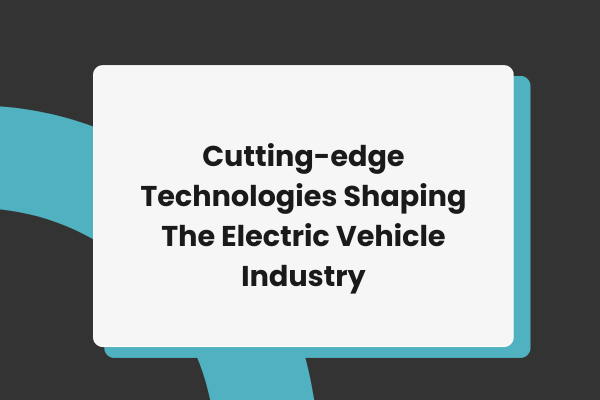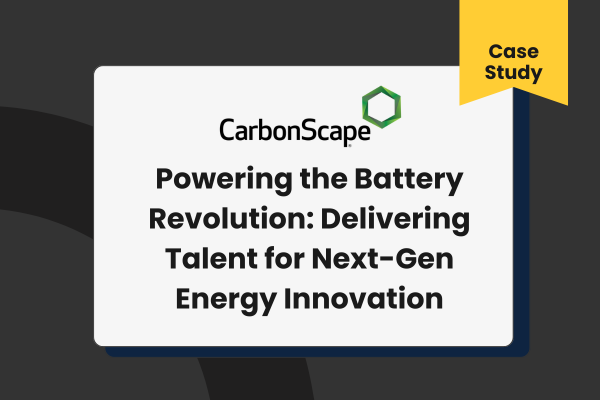How Technology Is Impacting the EV Industry
The electric vehicle (EV) industry is constantly evolving due to ongoing technological advancements. From breakthroughs in battery technology to the integration of smart charging infrastructures and sustainable energy solutions, technology is redefining the landscape of electric mobility. Employers and candidates must stay ahead of these changes to remain competitive in the market.
Below are some of the standout changes and evolutions in the EV industry that have been directly impacted by technology.
1. Advancements in Battery Technology
Battery innovation remains at the forefront of EV development. Traditional lithium-ion batteries are being supplemented by solid-state batteries, which offer higher energy densities, faster charging times, and improved safety profiles. Companies like CATL and QuantumScape are leading the charge in this domain.
The concept of a circular battery economy is gaining traction. By repurposing end-of-life EV batteries for secondary applications, such as stationary energy storage, the industry is addressing sustainability concerns and reducing reliance on raw material extraction. Sustainability is an ongoing topic that has gained popularity, traction and deep meaning to candidates looking for their next role. People want to know that they are working for companies with sound values that actively make a positive impact globally and on the environment.
2. Evolution of Charging Infrastructure
The production of EVs requires a robust and intelligent charging infrastructure. Technological innovations are making charging more efficient and accessible:
- Ultra-fast and Bidirectional Charging: These technologies are revolutionising energy flow, allowing vehicles to draw power and also supply it back to the grid.
- Wireless Charging: Pilot programs are exploring contactless charging solutions. This offers convenience and reduces wear on physical connectors.
- Smart Grid Integration: Incorporating EV charging into smart grids allows for dynamic load management, optimising energy use and supporting renewable energy integration.
3. Integration of Autonomous and Connected Vehicle Technologies
EVs are increasingly serving as platforms for autonomous driving technologies. The integration of AI and machine learning is enhancing vehicle intelligence:
- Advanced Driver Assistance Systems (ADAS): These systems are becoming standard, improving safety and driving efficiency.
- Vehicle-to-Everything (V2X) Communication: Facilitates real time data exchange between vehicles and infrastructure, enhancing traffic management and safety.
- Over-the-Air (OTA) Updates: Allow for continuous software improvements without the need for physical interventions.
4. Sustainable Energy Management
Software solutions are playing a pivotal role in improving EV operations:
- Fleet Management Platforms: Assist businesses in monitoring and optimising EV usage and charging schedules.
- Real-time Data Analytics: Provide insights into driving patterns and energy consumption, promoting efficient energy use.
- Predictive Maintenance: Software tools can anticipate maintenance needs, reduce downtime and extend vehicle lifespan.
5. Advances in Manufacturing and Supply Chain
Technological advancements are streamlining EV production:
- 3D Printing: Accelerates prototyping and reduces manufacturing costs.
- Automation and Robotics: Enhance precision and safety in production lines.
- AI-driven Supply Chain Management: Improves resilience and sustainability by improving logistics and inventory management.
6. Smart Energy Management Systems
Companies like Sparkion are pioneering intelligent energy management solutions:
- SparkCore™ EMS: An AI driven system that integrates EV chargers, battery storage, and renewable energy sources, boosting energy distribution and system uptime.
- Dynamic Load Balancing: Adjusts energy distribution in real-time, preventing overloads and maximising efficiency.
- Renewable Energy Integration: Aligns EV charging with renewable energy availability, promoting sustainability and cost savings.
7. Sustainable Graphite Production with Biographite
Graphite is a critical component in lithium-ion batteries, traditionally sourced through environmentally intensive mining or synthetic processes. CarbonScape, a New Zealand-based company, is modernising this aspect by producing biographite, a sustainable, high performance graphite derived from forestry by-products like woodchips.
Key advantages of biographite include:
- Environmental Sustainability: Biographite production emits significantly less CO₂ compared to traditional methods and applies renewable resources, reducing the carbon footprint of EV batteries.
- High Performance: Biographite matches or exceeds the performance of conventional graphite in battery applications.
- Supply Chain Resilience: By localising production and reducing dependence on imported graphite, biographite improves the stability and security of the EV battery supply chain.
The Impact on Talent and Recruitment
The evolution of the EV industry is generating a surge in demand for skilled professionals across many areas, including software engineering, battery technology, data analytics, and renewable energy systems. As the industry becomes more complex, the need for specialised recruitment strategies is becoming more important.
Technology is the driving force behind its EV’s rapid transformation. As advancements continue to develop, staying ahead of these changes is crucial for stakeholders across the industry.
Sources
https://evmagazine.com/top10/top-10-tech-changing-ev-landscape


